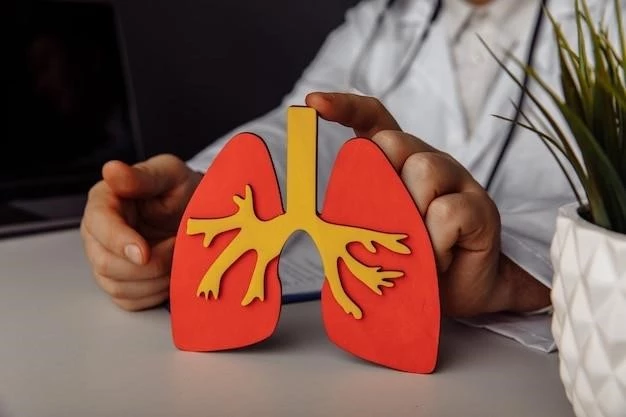Plan⁚ Adenocarcinoma of Lung
Understanding the causes of adenocarcinoma of the lung is crucial in its management and prevention. Various factors such as smoking‚ exposure to radon gas‚ and genetic predispositions play a significant role in its development.

Causes of Adenocarcinoma of Lung
Adenocarcinoma of the lung has various causes‚ with the most common being tobacco smoke‚ both direct and secondhand. Exposure to carcinogens like radon gas‚ asbestos‚ and air pollution can also contribute to the development of this type of lung cancer. Genetic factors‚ such as mutations in specific genes‚ may increase susceptibility to adenocarcinoma. Understanding these causes is crucial for prevention and early detection.
Symptoms and Signs of Adenocarcinoma of Lung
Adenocarcinoma of the lung can present with various symptoms and signs‚ including persistent cough‚ chest pain‚ shortness of breath‚ coughing up blood‚ fatigue‚ unexplained weight loss‚ and recurrent respiratory infections. Additionally‚ some patients may experience hoarseness‚ wheezing‚ or difficulty swallowing. Recognizing these signs early is essential for timely medical intervention and improved outcomes.
Diagnosis of Adenocarcinoma of Lung
Diagnosing adenocarcinoma of the lung involves a series of steps‚ including imaging tests like X-rays‚ CT scans‚ and PET scans to identify lung nodules or masses; A biopsy is crucial for confirming the diagnosis‚ which may involve a bronchoscopy‚ needle biopsy‚ or surgical biopsy. Molecular testing for genetic mutations can help determine the best treatment approach. Additionally‚ staging tests such as MRI and bone scans assess the extent of cancer spread.
Treatment Options for Adenocarcinoma of Lung
Treatment for adenocarcinoma of the lung may include surgery to remove the tumor‚ chemotherapy to target rapidly dividing cancer cells‚ radiation therapy to destroy cancer cells‚ targeted therapy to block specific abnormalities in the cancer cells‚ immunotherapy to boost the body’s immune response against the cancer‚ or a combination of these approaches. The choice of treatment depends on the stage of cancer‚ overall health‚ and individual characteristics of the patient.
Prognosis and Survival Rates of Adenocarcinoma of Lung
The prognosis and survival rates for adenocarcinoma of the lung depend on various factors such as the stage of cancer at diagnosis‚ overall health of the patient‚ response to treatment‚ and presence of specific genetic mutations. Early detection and treatment can significantly improve prognosis. The 5-year survival rate for patients with localized adenocarcinoma is higher than for those with advanced stages of the disease. Regular follow-up care and monitoring are essential for long-term management and surveillance.
Risk Factors for Developing Adenocarcinoma of Lung
Several risk factors contribute to the development of adenocarcinoma of the lung. The primary risk factor is tobacco smoke‚ including both active smoking and exposure to secondhand smoke. Other factors include exposure to radon gas‚ asbestos‚ and other carcinogens‚ as well as a family history of lung cancer. Individuals with certain genetic mutations or lung diseases are also at higher risk. Understanding these risk factors is essential for implementing preventive measures and early detection strategies.
Prevention Strategies for Adenocarcinoma of Lung
Prevention of adenocarcinoma of the lung primarily involves avoiding exposure to known risk factors. Quitting smoking and avoiding secondhand smoke are crucial steps in reducing the risk of developing lung cancer. Mitigating exposure to radon gas‚ asbestos‚ and environmental pollutants can also help prevent lung cancer. Regular physical activity‚ a healthy diet‚ and maintaining a healthy weight may contribute to overall lung health. Additionally‚ early detection through screening programs for high-risk individuals can lead to timely interventions and improved outcomes.
Latest Research and Advances in Adenocarcinoma of Lung
Ongoing research in adenocarcinoma of the lung focuses on personalized medicine approaches‚ targeted therapies‚ immunotherapies‚ and early detection methods. Advances in genetic profiling and biomarker identification are shaping precision medicine strategies for tailored treatments. Clinical trials are exploring novel drug combinations and treatment modalities to improve outcomes for patients with advanced disease. Additionally‚ research efforts are directed towards understanding the tumor microenvironment and immune responses to develop more effective therapies. Stay updated with the latest developments to enhance patient care and outcomes.
